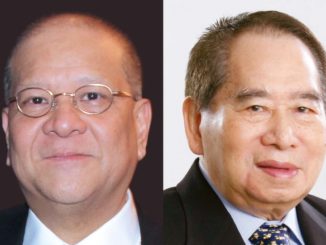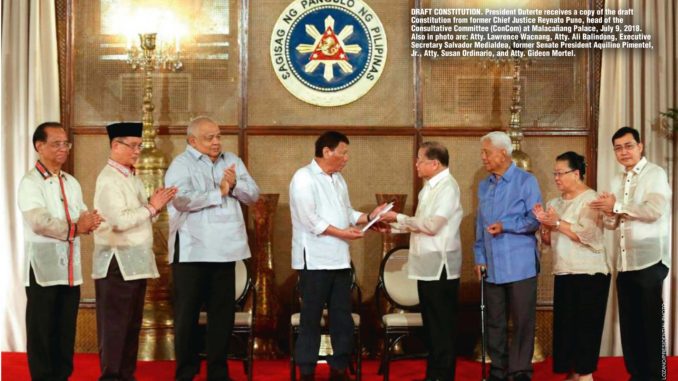
Congratulations to Communications Assistant Secretary Mocha Uson. In just 24 seconds, the beauteous retired purveyor of online porn has done more for federalism than what the entire 25-person Constitutional Committee of President Duterte has achieved in the past six months.
On Thursday, August 2, Mocha and friend Drew Olivar aired a brief online video on federalism. Federalism, with 18 federated regions, is being proposed by the ConCom headed by former Chief Justice Renato Puno as a panacea to the Philippines’ age-old problems of poverty, income inequality, and government corruption and incompetence.
 The video has been seen by at least 362,000 people, making it viral. A n old video on federalism aired on YouTube which explains in pedantic and perfunctory tone the United States federalism has only 32,000 views.
The video has been seen by at least 362,000 people, making it viral. A n old video on federalism aired on YouTube which explains in pedantic and perfunctory tone the United States federalism has only 32,000 views.
In the Age of the Internet, communications is not just about information or education. It is more entertainment. Information that is bullshit is more entertaining and better appreciated when peddled as pure entertainment that is part joke, part satire, and part goodtime. “Good time” is a Filipino slang for “pulling one’s leg”. It also has sexual connotations.
In a 24-second video entitled “Good News Game Show with Drew and Mocha,” Drew danced a jingle with the following lyrics: “I-pepe, i-pepe, i-dede, i-dede, i-pepe-pepe-pepederalismo!”
The male host suggestively touched his crotch (his “pepe”) and chest (his “dede”) while dancing the jingle.
To me, the video and its lyrics are pregnant with meaning. It shows Mocha has, indeed, something between her ears.
In Filipino slang, “pepe” refers to the genitals. Young boys are instructed by their moms to bring out their “pepe” to urinate as part of their toilet training. “Dede”, on the other hand, usually refers to a woman’s breast. When a baby is hungry, the baby has to “dede” and the mother exposes her “dede”.
Now, any government worth its salt has two basic functions — feeding the people (the “dede” function) and running a clean and efficient government, otherwise, the people are screwed up (this is the “pepe” function).
Now, can a proposed federal government do its “dede” function well?
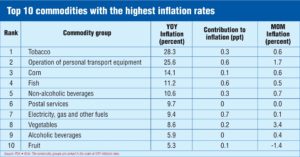 Judging by recent history, the answer is No. That is why you have inflation that is the highest in six years. The current (July) 5.7% inflation is basically a reflection of high food prices. Food prices are high because there is not enough supply of it. Like rice. The country needs to import rice yearly to the tune of two million tons.
Judging by recent history, the answer is No. That is why you have inflation that is the highest in six years. The current (July) 5.7% inflation is basically a reflection of high food prices. Food prices are high because there is not enough supply of it. Like rice. The country needs to import rice yearly to the tune of two million tons.
But the government effectively bans rice imports and imposes hefty tariffs on its importation — 35 to 50%. This makes Philippine rice price double the world price of rice.
Unfortunately, rice is 20% of the Consumer Price Index. Of every 100 CPI points, 20 points come from rice, meaning 20% of the average Filipino household’s expenditure is spent on rice. Of the annual inflation rate of 5.2% in June, 0.5% came from rice,which means that without rice inflation, the inflationrate would have been just 4.7%.
Another major contributor to high inflation is fish inflation. It contributed 0.6% to the 5.2% June inflation rate. Without fish inflation, the inflation rate would have been just 4.6%. The Philippines also has a severe fish shortage. Yet, the government restricts fish imports with tariffs of 7 to 15%.
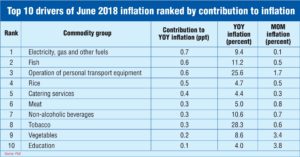 Together, rice and fish inflation contributed 1.1% to the June inflation rate. Without rice and fish inflation, the June inflation rate should have been just 4.1%, and there would not have been sharp increases in interest rates and in prices of other commodities. Duterte’s net satisfaction rating, per the Social Weather Stations survey of June 2018, would not have dropped precipitously to +45 in June, from +59 in March, a sharp fall of 14 points. Assuming there are 50 million adult Filipinos, a 14-point drop is equivalent to 7 million people. That’s big.
Together, rice and fish inflation contributed 1.1% to the June inflation rate. Without rice and fish inflation, the June inflation rate should have been just 4.1%, and there would not have been sharp increases in interest rates and in prices of other commodities. Duterte’s net satisfaction rating, per the Social Weather Stations survey of June 2018, would not have dropped precipitously to +45 in June, from +59 in March, a sharp fall of 14 points. Assuming there are 50 million adult Filipinos, a 14-point drop is equivalent to 7 million people. That’s big.
The Consultative Committee (Con Com) which drafted a new Constitution had previously tapped Uson to educate Filipinos on federalism.
Con Com spokesperson Ding Generoso said more Filipinos would know about federalism because Uson has a huge following on social media, with her Facebook page having close to 5.7 million followers.
After the outrage that the “pepe, dede pederalismo” video has triggered, Generoso, the ConCom itself and countless thoughtful Filipinos have distanced themselves from Mocha Uson.
Common. Mocha Uson has just taught us an important lesson in governance. Governance is feeding the people. That is dede. Failing in that, government screws you up. That is the pepe part. Believe me. Just like the present and the previous forms of government for the Philippines, federalism surely won’t deliver on both the “dede” and “pepe” of governance.
— Tony Lopez
WHAT THE LAW SAYS ON TARIFF REDUCTIONS
Republic Act No. 10863: An Act Modernizing the Customs and Tariff Administration
Section 1608. Flexible Clause
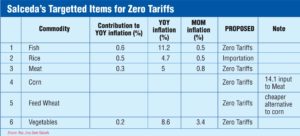 (a) In the interest of the general welfare and national security, and, subject to the limitations prescribed under this Act, the Parliament, upon the recommendation of the NEDA, is hereby empowered to:
(a) In the interest of the general welfare and national security, and, subject to the limitations prescribed under this Act, the Parliament, upon the recommendation of the NEDA, is hereby empowered to:
(1) Increase, reduce, or remove existing rates of import duty including any necessary change in classification. The existing rates may be increased or decreased to any level, in one or several stages, but in no case shall the increased rate of import duty be higher than a maximum of one hundred percent (100%) ad valorem;
(2) Establish import quotas or ban imports of any commodity, as may be necessary; and
(3) Impose an additional duty on all imports not exceeding ten percent (10%) ad valorem whenever necessary: Provided, That upon periodic investigations by the Commission and recommendation of the NEDA, the President may cause a gradual reduction of rates of import duty granted in Section 1611 of this Act, including those subsequently granted pursuant to this section.
 (b) Before any recommendation is submitted to the President by the NEDA pursuant to the provisions of this section, except in the imposition of an additional duty not exceeding ten percent (10%) ad valorem, the Commission shall conduct an investigation and shall hold public hearings wherein interested parties shall be afforded reasonable opportunity to be present, to produce evidence and to be heard. The Commisison shall also hear the views and recommendations of any government office, agency, or instrumentality. The Commission shall submit its findings and recommendations to the NEDA within thirty (30) days after the termination of the public hearings.
(b) Before any recommendation is submitted to the President by the NEDA pursuant to the provisions of this section, except in the imposition of an additional duty not exceeding ten percent (10%) ad valorem, the Commission shall conduct an investigation and shall hold public hearings wherein interested parties shall be afforded reasonable opportunity to be present, to produce evidence and to be heard. The Commisison shall also hear the views and recommendations of any government office, agency, or instrumentality. The Commission shall submit its findings and recommendations to the NEDA within thirty (30) days after the termination of the public hearings.
(c) the power of the President to increase or decrease rates of import duty within the limits fixed in subsection (a) hereof shall include the authority to modify the form of duty. In modifying the form of duty, the corresponding ad valorem or specific equivalents of the duty with respect to imports from the principal competing foreign country for the most recent representative period shall be used as basis.
(d) Any order issued by the President pursuant to the provisions of this section shall take effect thirty (30) days after promulgation, except in the imposition of additional duty not exceeding ten percent (10%) ad valorem which shall take effect at the discretion of the President.
(e) The power delegated to the President as provided for in this section shall be exercised only when Congress is not in session.
(f) The power herein delegated may be withdrawn or terminated by Congress through a joint resolution.
The NEDA shall promulgate rules and regulation necessary to carry out the provisions of this section.



